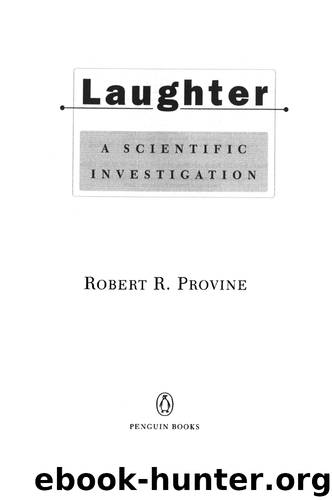Laughter: A Scientific Investigation by Robert R. Provine

Author:Robert R. Provine [Provine, Robert R.]
Language: eng
Format: epub
ISBN: 9781101659250
Publisher: Penguin Publishing Group
Published: 2001-11-30T23:00:00+00:00
HOLY LAUGHTER
Our mouths were full of laughter and our tongues sang aloud for joy.
—Psalms 126:2
Does laughter bring us nearer to God or signify being filled with the Holy Spirit? Exuberant worship, sometimes featuring laughter, has cycled in and out of favor, having a place in the heritage, if not current practice, of many denominations. Before they adopted the more reserved practice of quiet meditation, the original Quakers of mid-1600s England actually quaked. More specifically, they were described to fall, foam at the mouth, roar and swell in their bellies. The early Quakers also had the disconcerting habit of sometimes going about naked as testimony of their faith. And the Shakers of mid-1700s New England actually shook in religious ecstasy—singing, jumping, and dancing were often parts of their religious services. The early Methodists of John Wesley also did a lot of shaking and quaking.
These fervent and animated practices have not disappeared from religious life—the Pentecostal and related “charismatic” churches that continue such traditions are, in fact, the most rapidly growing Christian denominations. The United States has been a fertile ground for the evolution and growth of such sects, some transplanted and some native, particularly among the economically, socially, and religiously disenfranchised. America’s unique religious heritage has its roots not in the urban centers of the power elite, but in frontier camp meetings and revivals with names like Cane Ridge, and in the humble Azusa Street Mission in Los Angeles.
“Laughing revivals” offer an intriguing contemporary manifestation of this “old time religion” that provide fascinating case studies in the power of contagious laughter. In the article “Laughing for the Lord,” Time magazine (15 August 1994) reports the growing popularity of “laughing revivals” among many groups, including the otherwise reserved Anglicans. This “holy laughter” is the adoption of a practice already established in the more flamboyant services of the Pentecostals. Even the historic Cane Ridge (Kentucky) Revival of 1801 had a “laughing exercise.”
The visitation of the Holy Spirit to members of the contemporary congregations is signaled by the spread of laughter through the group, followed in some by falling to the floor, sobbing, shaking, twitching, speaking in tongues, and even roaring. In secular contexts, you have probably heard that someone “laughed till they cried,” or were “weak in the knees.” These evangelicals are exploiting these powerful psychological and physiological consequences of laughter in their religious services. The contagiousness, perseveration (once started, it’s hard to stop), and social bonding of laughter (we laugh with our friends and relatives) all work to enhance the power of the laugh experience in a communal setting. Unlike the more subtle practices of prayer or meditation, worshipers can actually feel the physiological changes taking place within their bodies during laughter and assign this effect to the divine.
The immediate and powerful consequences of holy laughter are very appealing to those who are self-selecting for such experiences by attending Pentecostal church services. Holy laughter has much in common with glossolalia (speaking in tongues), the defining characteristic of Pentecostal churches. Both laughter and speaking in tongues signify being filled with the Holy Spirit.
Download
This site does not store any files on its server. We only index and link to content provided by other sites. Please contact the content providers to delete copyright contents if any and email us, we'll remove relevant links or contents immediately.
Should I Stay or Should I Go? by Ramani Durvasula(7645)
Why We Sleep: Unlocking the Power of Sleep and Dreams by Matthew Walker(6693)
Fear by Osho(4726)
Flow by Mihaly Csikszentmihalyi(4684)
Rising Strong by Brene Brown(4447)
Why We Sleep by Matthew Walker(4432)
The Hacking of the American Mind by Robert H. Lustig(4368)
How to Change Your Mind by Michael Pollan(4350)
Too Much and Not the Mood by Durga Chew-Bose(4333)
Lost Connections by Johann Hari(4168)
He's Just Not That Into You by Greg Behrendt & Liz Tuccillo(3878)
Evolve Your Brain by Joe Dispenza(3662)
The Courage to Be Disliked by Ichiro Kishimi & Fumitake Koga(3477)
Crazy Is My Superpower by A.J. Mendez Brooks(3393)
In Cold Blood by Truman Capote(3374)
Resisting Happiness by Matthew Kelly(3335)
What If This Were Enough? by Heather Havrilesky(3302)
The Book of Human Emotions by Tiffany Watt Smith(3289)
Descartes' Error by Antonio Damasio(3270)
